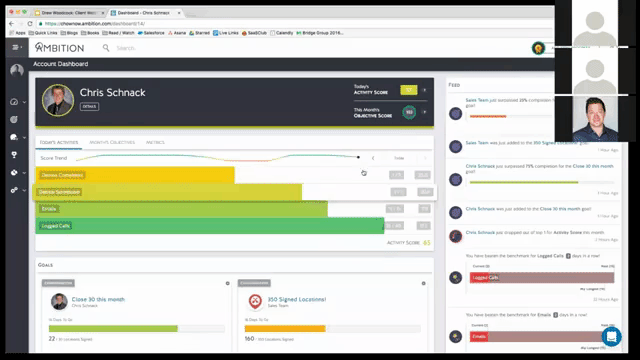This post covers the 5 keys to effective sales coaching - and how to apply them to your sales organization.
“That which is measured improves. That which is measured and reported improves exponentially.” Pearson’s Law
— Ted Alling 👊🏼🚀 (@tedalling) February 20, 2018
Being an elite sales coach means creating a system of consistency and accountability around coaching up rep performance. The smartest sales coaches start with their top performers, then figure out:
- What contacts and accounts they talk to.
- What they say during calls, meetings, etc.
- What they do during their day-to-day process, in terms of activities.
Your reps need a consistent schedule and framework to follow that will make them accustomed to receiving coaching and implementing manager recommendations into their day-to-day. And today on the Ambition Blog, we're showing you exactly how to create one.
The 5 Staples of Effective Sales Coaching
In our experience, there are 5 keys to create a system of consistency and accountability around coaching.

The first two keys to excellent sales coaching go toward the need for consistency in your sales coaching framework.
Sales Coaching Key #1. Consistent Schedule
Have clear recurring frequency on 1:1s with reps. Weekly check-ins are ideal. Bi-monthly check-ins are okay. Monthly check-ins are sub-ideal.
Sales Coaching Key #2. Consistent Format
Provide a standard set of questions and baseline information that needs to be gathered and shared ahead of the 1:1.

This frames the rep's mindset when prepping for the meeting and gives the sales leader the pertinent information to have a productive conversation.
You can still start with small talk, but you have the details to launch into the main course.
Sales Coaching Key #3. Objective Data
Provide access and visibility to core KPIs for each rep - detailing each person's output and performance vs their own goals and relevant peers - is critical. You've got to be able to look at specific data to make specific suggestions.


Put it this way, if you can't see your progress on a map, how do you know if you're ever going to get there?
Sales Coaching Key #4. Action Items
Every sales coaching session should end with action-items or initiatives that reps (or managers ;) !!) can execute on in the interim before the next 1:1.
Action items also establish a base for the recurring 1:1 meeting cycle. Each action item should be moving to completion. If there is a failure to complete a given action item, then it should be addressed before the next 1:1.
Sales Coaching Key #5. Notes + Narrative
Meetings are a series of points in the rep's trajectory. As a manager you need to keep track of what is going on, have referenceable notes, and be able to see a story about where each rep is trending and how they have progressed to today.
More Sales Coaching Resources
Check out these great sales coaching resources from Ambition.
- The Beginner's Guide to Agile Sales Management
- The Winner's Guide to Effective Sales Coaching
- The Salesforce KPI Report
- The Sales Performance Index
- 100 World-Class Sales Coaches (A to Z)
Prefer podcasts to articles? Subscribe to The Sales Influencer Series on Soundcloud to listen to our interviews with best-in-class sales leaders like Mike Weinberg, Gary Vaynerchuk, John Barrows, and Tamara Schenk.
Ambition: The Agile Sales Management Platform
Harvard Business Review and AA-ISP (the Global Inside Sales Organization). Fortune 1000 sales organizations like UPS, Aerotek and Wayfair use Ambition to enhance sales KPI clarity and drive their teams using real-time scorecards, dashboards, alerts, contests, and TV leaderboards.
Contact us to schedule a demo of Ambition for your sales force today.
 Back
Back




